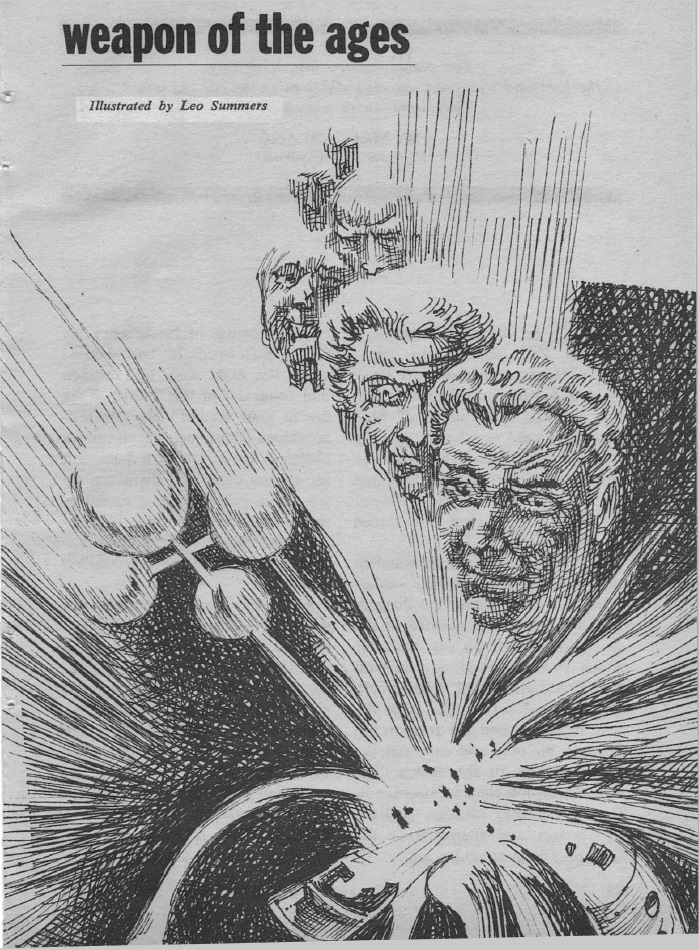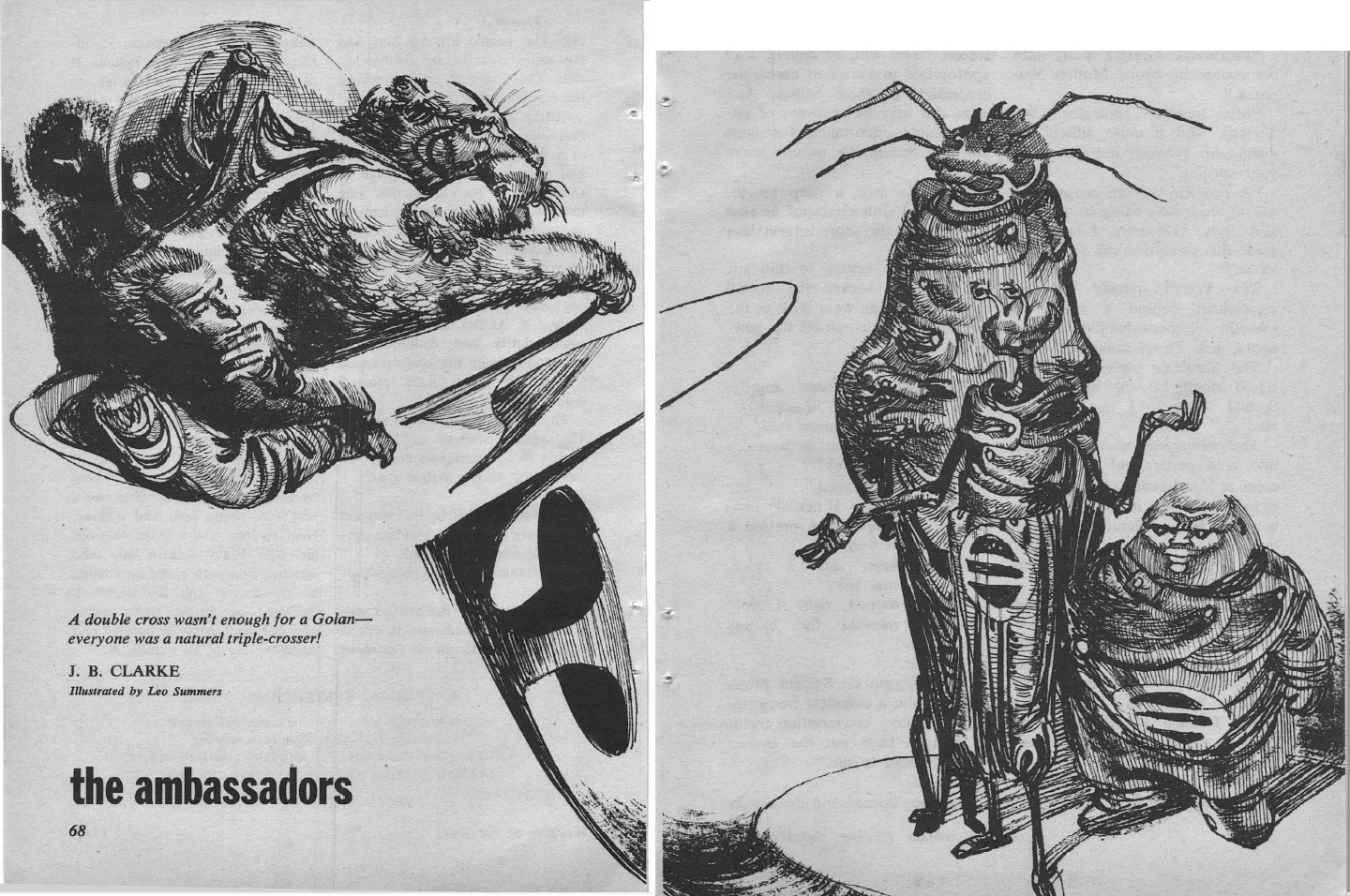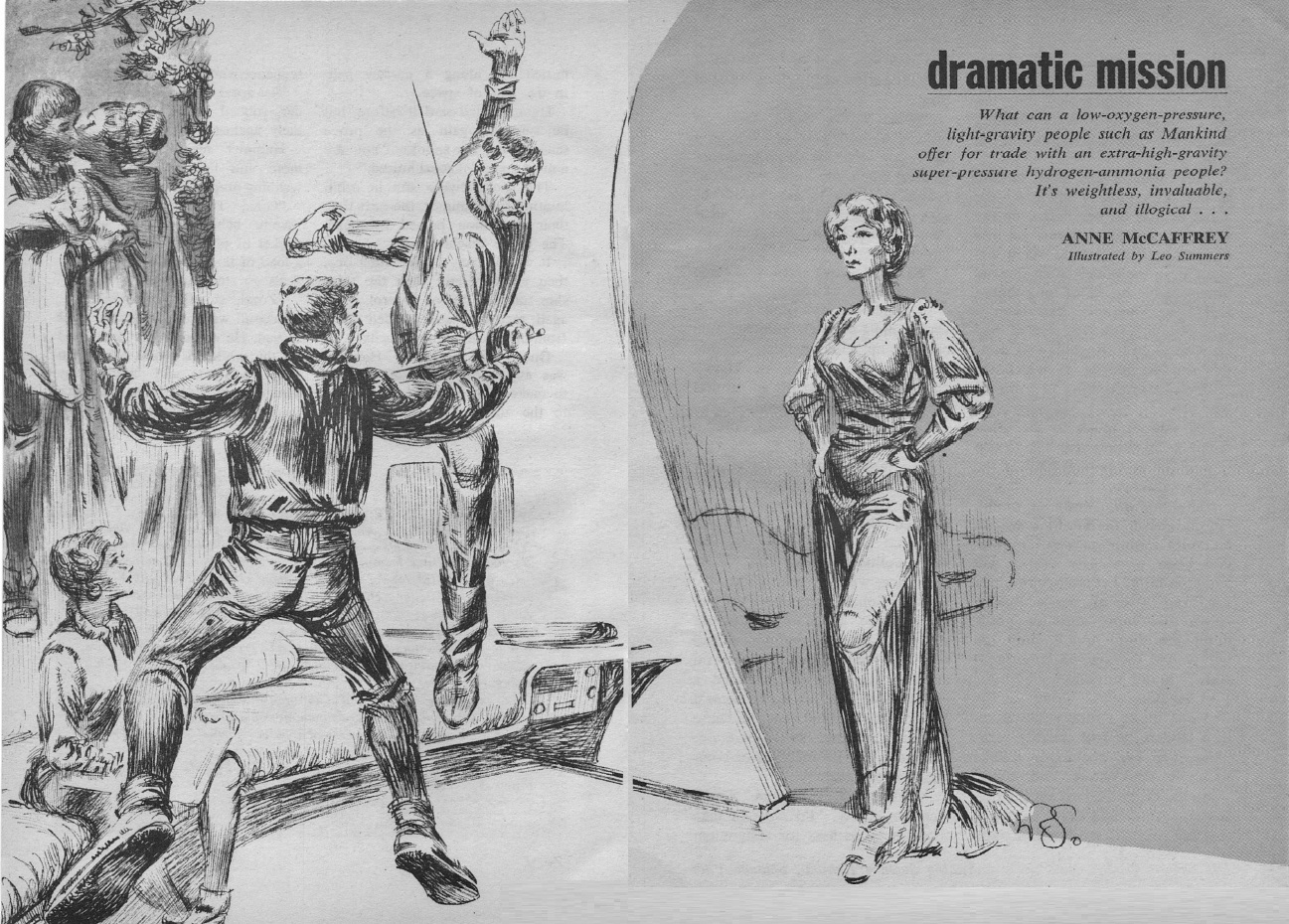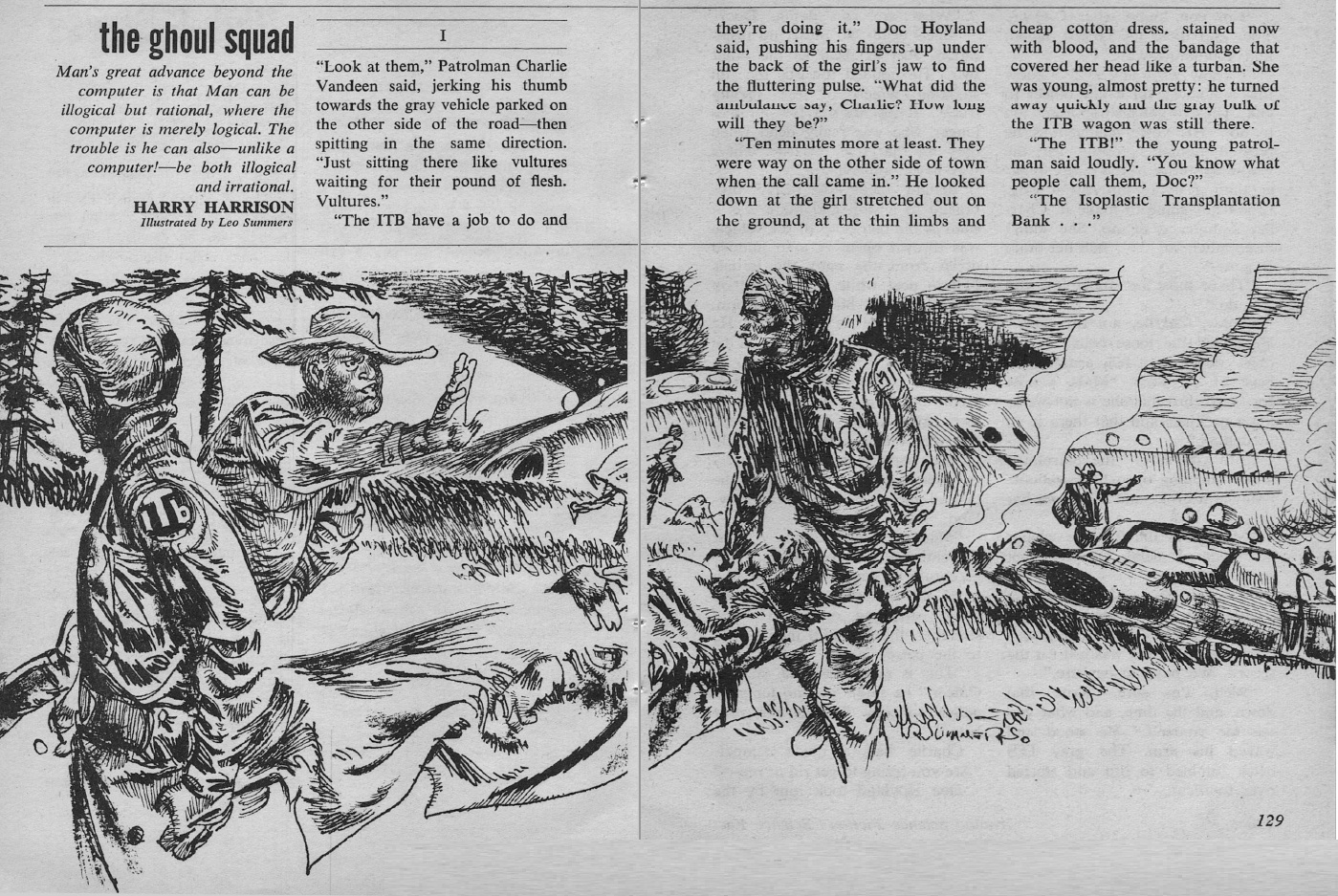Science Fiction Theater Episode #10
Tonight (Oct. 31), tune in at 7pm (Pacific) for our special, Halloween-themed episode!

by Gideon Marcus
Inside Lebanon
Feel that? It's the calm before the storm.
For the past week, the nation of Lebanon has been rocked from within by "Palestinian" guerrillas. Yesterday, at the behest of leaders in Cairo, Damascus, and Tripoli, the raiders settled down, awaiting what looks like will be a significant negotiation between Arab power brokers.
I'm no expert on the issue, but here's what I've gleaned. When Israel declared independence in 1948, a significant percentage of the Arab population within the nascent nation's borders left the former mandate of Palestine. Some fled violence, like that inflicted by classy folk such as Menachem Begin of the Irgun, a Jewish terrorist group. Others left at the exhortation of their Arab brethren, who proclaimed that they were about to drive the Jews into the sea.
Hundreds of thousands of Arabs ended up in neighboring countries: Jordan, Egypt, Syria, and Lebanon. Indeed, exiled Arabs now comprise 12% of the population of Lebanon—fully 300,000 people. They live in camps administrated by the draconian Lebanese Deuxième Bureau.

The "Palestinian Liberation Organization", founded in 1964 with the goal of "the liberation of Palestine", initiated terrorist attacks against Israel after The Six Day War in 1967. Such are being carried out from enclaves in other countries with more or less tacit permission from those countries' governments.
The recent irruption in Lebanon arose from the Lebanese cracking down on these raids. The violence, thwarted from heading southward, flooded internally—into Beirut, Tyre, Lebanese Tripoli, and other major cities. Egypt, Syria, and Libya all leaned hard on the Christian Arab nation to let loose the reins on the guerrillas. Lebanon has relented, and the negotiations will proceed shortly. Participants will be Dr. Hassan Sabri El Kholi, personal envoy of Egyptian President Gamal Abdel Nasser, Libyan Interior Minister Mousa Ahmed, and guerrilla chief Yasser Arafat. While there's no telling what the outcome will be, one has to imagine the Palestinians will be allowed to resume their raids into Israel again.
With the War of Attrition occupying Israel on its western and eastern fronts, it now looks as if the Jewish state is about to be busy defending from the north, too. Most folk are betting on the Israeli Defense Force, but can the country survive under siege forever?
Time will tell.
Inside Analog

by Vincent Di Fate
Like Lebanon, the crisis facing Analog comes from within, as evidenced by the latest issue. From without, the magazine looks like it always has—handsome, professional. But within, one can see the rot. Not that it's all bad; indeed, much of it is decent. But what works is stagnant, and what doesn't work is very much the sort of thing we expect from long-toothed editor John Campbell.
Gottlos, by Colin Kapp
Starting off, we have what looks like a Bolo story—one of those Keith Laumer tales featuring a sentient, super-tank. Unlike Laumer's stories, this one has a lot of action, with the Fiendish mauling dozens of opposing vehicles, overruning a command post, and then meeting its match with the arrival of the ebony Gottlos.
After Fiendish is destroyed, we learn that it was actually a remotely controlled tank. Its pilot, Manton, had so thoroughly melded with the machine, that the result was a gestalt personality, one motivated by violence and vengeance. With his vehicle destroyed, Manton falls into an apparent funk, shaken by the appearance of a more powerful machine. The real terror of Gottlos is that it seems to need no radio controls at all. Is it autonomous? A kind of cybernetic beast?
Kapp has written more of a philosophical than predictive piece, describing how a society might decay under the strain of endless war and complete mechanization. I appreciate Kapp's skill with English, but the story itself seemed a bit implausible in its setup.
Three stars.
Telepathy – Did It Happen?, by J. B. Reswick and L. Vodonik

Oh boy. A pair of cranks conducted a telepathy experiment. Here's the notion: telepathy is only reliable about 1-2% of the time. But what's really happening, they suppose, is that there's just so much interference that the message gets clogged with static. If one conducts thousands of tests using a simple message, the errors will be reduced, and the message will stand out.
The setup they used involved a binary message and transmitter. After many trials, the experimenters determined that had gotten the error down low enough to show that something had objectively been transmitted. Of course, the researchers admitted that their data only supported this conclusion if you read the results backwards (i.e. if the 1s of the original message were logged as 0s and vice versa.)
Given the thin margins of success, if you gotta flip the results on their heads to get any kind of answer, I suspect it's all bogus. Which is how I'm beginning to feel about psionics in general.
One star.
Weapon of the Ages, by W. Macfarlane

by Leo Summers
Humanity is hounded by vicious extraterrestrials when they try to go to the stars. One pilot crashlands on a neutral world, is conducted to a mysterious weapon, and manages to wipe out a set of local marauders. The weapon's use has side effects, one which the owner's race is prepared for, but not the human who fired it.
Macfarlane is trying for a cute sting-in-the-tail story, but the whole thing is nonsensical, so it lacks the desired impact.
Two stars.
The Ambassadors, by as by J. B. Clarke

by Leo Summers
A set of three disparate aliens makes contact with the galactic organization of which the humans are a member. Said aliens claim to be vastly superior to our federation, but they say they'll be generous and give us a few technological wonders—if only we'll give them an example of one of our best starships, so they can gauge our level of progress. Since homo sapiens has (per the story) an unique ability to sniff out a scam, a human is sent to investigate to see if the aliens are on the level.
Things that suggest the aliens are hoaxing: they showed up in a borrowed spaceship, no one has ever heard of their stellar confederation, and their "capital" planet is a smoggy wasteland. Points in their favor: the three wear a common uniform and despite profound apparent racial differences, work together in perfect harmony. Conclusion, they must represent an ancient and tight-knit federation!
Much is made of the fact that most species in the galaxy are bi-sexual. Not that you'd know from this story, whose only female human is a "pert secretary." The leader of the alien delegation is a female, to the surprise of the humans receiving them. Cue the snide comments about how women always have to speak for the menfolk (the implication being that such arrogance is misplaced). In the end, the gender of the aliens is the key to unpuzzling the obvious hoax.
Clarke spends a lot of time setting up a puzzle whose solution is apparent from nearly the beginning. The characters have to be obtuse to make the story work. Obtuse and sexist.
One star.
Shapes to Come, by Edward Wellen

by Vincent Di Fate
A scientist in an isolated base on the Moon has completed his work: he has perfected a spore that will inject itself into any alien genetic structure, instilling an irresistible trust of the human form. By seeding the stars with this spore, when we meet any extraterrestrials, they will necessarily greet us with love and affection.
But before the spore can be deployed, an alien armada shows up. Can you guess what completely unexpected result ends the tale based on the story's setup?
This is comic book level stuff. Two stars.
The Yngling (Part 2 of 2), by John Dalmas

by Kelly Freas
Concluding the two-part serial begun last ish, The Yngling latter half is choppy but worthy.
When we last left our hero, the psi-adept Nordic warrior, Nils Ironhand, he had been sent into the lion's den. More specifically, to the domain of Kazi, an immortal (through soul transferrence into new bodies) who reigns through unbelievable cruelty. His armies are poised at the doorstep of Europe, and in short order, more than thirty thousand of his "orc" hordes will sweep through the Balkans bent on rapine and ravagery.
Nils presents a condundrum to the psionic tyrant as his signature trait is the lack of an internal monologue. Thus, his mind cannot be read, barely even sensed. He also is completely without guile. Interestingly, while this wordless mentality is portrayed as an unique characteristic, and perhaps a side effect of Nils' psi powers, it can't be that rare in the real world. Indeed, one of the Journey's very own, Tam Phan, possesses this trait. Now, Tam is also a fantastic warrior, so there may be a connection.

Tam and familiar faces at a local gathering of Vikings
In any event, after Nils gets to witness some particularly gruesome examples of Kazi's barbarism, he escapse, makes it back to Hungary, and organizes a resistance comprising Magyar, Ukrainian, Polish, and Bohemian knights…as well as hundreds of his kinsman, who have just crossed the Baltic, fleeing the impending Ice Age. The resulting battle is lengthy, desperate, and strategic in detail. Of course, you can guess who wins.
This is a tough book to rate! It's firmly in the genre of magical post-Apocalypse, along with Omha Abides, Spawn of the Death Machine, Out of the Mouth of the Dragon, and so on. I happen to like this genre, and while I'm growing to loathe psi stories, in these settings, I can just pretend it's a kind of magic, or maybe lost technology.
The key to writing this genre well, and Dilmas does, is to bathe it in sensuality and adventure. In many ways, Nils is more akin to Conan than any scientifical hero you'd expect to find in Analog. I also greatly appreciate that Dilmas manages to convey the most unspeakable of tortures completely obliquely. A few artful words can chill far more than pages of explicit gore.
Too, I enjoyed the grand depiction of the battle, complete with fog of war and the uncertainty that accompanies it. So vivid is this portion of the novel, that one could probably adapt a cracking wargame from it. Jim Dunnigan, are you listening?
It's not all roses, of course. As in the first half, the various sections of the novel don't quite hang together well, like bricks without mortar. Much is bridged in shorthand. Also, Nils having to retell the same story to half a dozen European lords to rally them against the orcs was a bit tiresome. Perhaps all of these things will be smoothed when this story inevitably gets picked up by Ace. Or maybe not—they like their books short.
Anyway, I'd give this installment four stars, three-and-a-half for the whole. Fans of this sort of thing, like my nephew, David, may notch up their assessments a touch.
Doing the math

Boy, Analog has been bad lately. I know it seems like I just keep saying it over and over again, but until these doldrums end, I'll have to find creative ways to repeat myself.
At 2.3 stars, Analog is by far the lowest in the pack. IF got 3.1; Vision of Tomorrow got 3.2; even Amazing got 3.2; Galaxy got 2.9; so did Venture; Fantasy and Science Fiction got 2.7; and New Worlds got 2.8.
Women wrote about 10% of what was published this month, and you could fit all the four and five star stuff in two digests. Given that eight came out for November, that's a pretty weak showing.
Perhaps if Ted White, Ed Ferman, Charles Platt, and Ejler Jakobsson went over to Condé Nast headquarters for a negotiation, Campbell might loosen the reins on his writers. Couldn't hurt!

![[Oct. 31, 1969] Struggling to get out (November 1969 <i>Analog</i>)](https://galacticjourney.org/wp-content/uploads/2024/10/691031analogcover-672x372.jpg)



![[May 31, 1969] When eras collide (June 1969 <i>Analog</i>)](https://galacticjourney.org/wp-content/uploads/2024/05/690531analogcover-665x372.jpg)





















